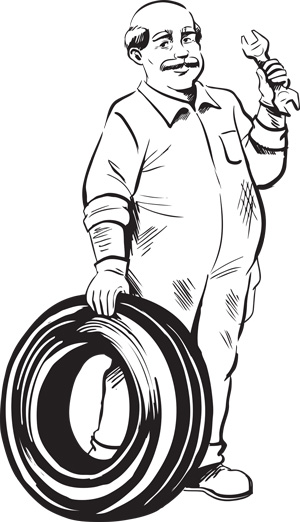Describing Yourself:
What Do You Do?
 |
Click to get this lesson as an Adobe Acrobat file for printing or use in a class. |
 |
Click to listen to this lesson while you read. |
When you describe yourself, you might think to describe your appearance, first. But, when you meet someone, they very seldom ask you what you look like! What are the questions that you ask someone when you first meet them? Perhaps one or more of these?

-
Where are you from?
-
What do you do?
-
What do you do for fun?
-
Do you like to read?
-
What's your favorite book?
Click Here for Step-by-Step Rules, Stories and Exercises to Practice All English Tenses
The list is, of course, limitless, but today we're going to start talking about some hobbies and interests, as well as the vocabulary to describe your hobbies and interests.
Talking about hobbies
Most of my students know the word "hobby" as a noun, meaning something they like to do, but they don't know that it's also an adjective. If my hobby is gardening, I wouldn't normally say "My hobby is gardening." I would say "I'm a hobby gardener." If you cook for fun, you can say you're a "hobby cook."
Of course, the example "hobby cook," is great, because it gives us a chance to talk about an important point. If your hobby is something that a lot of people do – like cooking, or learning English – to say that you're a "hobby cook" means that you probably cook more "complicated" or "difficult" meals. If we meet and you tell me that you're a "hobby mechanic," I hope you can do more than put gas in a car!

What are some words we use with hobbies? Well, here are a few worth learning:
-
Mess around: To "mess around" is to experiment, or to try something without a real plan. I like "to mess around in the kitchen," when I have the time to experiment with cooking. It's how I say I like to try to cook without recipes. You might like to "mess around" with cars, or with computers. I hope you do more than mess around with English!
-
Tinker: To tinker is one step above "messing around." To tinker is to work on something without a real plan, but as an (almost) expert. A mechanic might tinker with his car, to try to see if he can get it to go faster with less gas. A web designer might tinker with his website, to try to make it the best he can, or to make it load faster. My father tinkers with math: he was a math teacher and his hobby is learning new ways to use math. And, if you're a step above me as a cook, you can say you like to "tinker in the kitchen."
Tinkering is what we imagine our fathers or grandfathers doing in the garage. They might have a small workbench where, when something is broken, they tinker with it to see if they can get it to work. -
Interested in: Maybe your hobby isn't "hands-on." There are a lot of things that can be fun to do, but that happen mainly in your own head. Learning English is one example. I had a student whose hobby was learning about the Pharaohs of Egypt. She was interested in ancient Egyptian history. I'm interested in learning other languages. Interested in means you enjoy learning about something.
-
Love: Many of my students tell me that they don't like the way that Americans are always using the word "love" when they mean "like." And I suppose it can be confusing if you don't speak English, but if we enjoy doing something very much, you will hear us say "I love to read." Or, "I love reading." (Notice: use "to" with the infinitive and the gerund – that's the -ing form – without the word 'to')
When I describe my interests, I only use the word "love" for one activity. After all, you can't love everything! -
Into: Just like "interested in," into is a word we use to describe an "intellectual" hobby. You can be a Madonna fan, but most jazz fans say they're "into jazz." You can be into architecture, or into German history.
When you use the word into, you make your interest sound more intellectual, or intelligent. If you say you're into soccer, I expect that you more than play soccer, I expect you to know the names of famous players and coaches and to be able to discuss the strategies they use.
How I use these words
These are all words I use describing myself and other people. If I were to tell you about some of the people in my life, it might sound like this:
There's a guy at work who's really into wine. I guess you might say he's a hobby sommelier (I think that's the French word for the wine expert in a restaurant). Whenever I have a few extra Euros, I like to ask him for a recommendation and get a bottle of wine. The only problem is that he seems to be interested in wines that cost more than I can afford! A ten Euro bottle of wine is a lot for me!
If I were to describe my father-in-law, I might say this:
My father-in-law is a hobby woodworker, or carpenter. (That's someone who makes things out of wood.) He has a little hobby workshop (a room for tools and working) in his basement where he loves messing around with wood and what comes out of that workshop is really impressive! He made the bed my wife and I use, and he's working on another for my sister-in-law! And a lot of the furniture in his house he made himself. I think it's cool to have a hobby that "produces" something.
Of course, my father-in-law has many other hobbies, that's just one of them. (It's the one I sometimes wish I had.) And, like any son-in-law, I have more to say about my father-in-law than just what his hobbies are! But, that's today's topic. This week we'll practice other descriptions, but I think you'll agree that this is long enough, now!
What about you?
What are your hobbies? What are you into? Is there anything you love doing? How would you describe your interests? Write a paragraph about it!
Get Updates, Special Offers, and English Resources
Download your FREE GIFT (the first two chapters of
English Short Stories Book and Workbook)
as soon as you join!

By submitting your email, you consent to receiving updates and newsletters from us and to the sharing of your personal data with third parties for the purposes of sending you communications. We will not spam you. You can unsubscribe at any time. For more information, please see our privacy policy.





